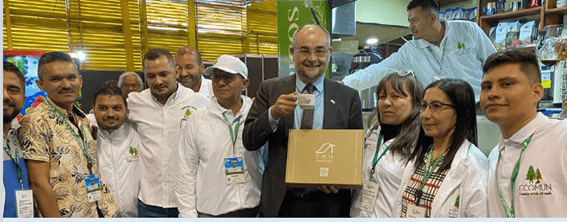
The European Peace Fund’s Solidarity Economy Communities (CES) project, implemented by the Mondragon Group (LKS Alecop), has strengthened production in various sectors including fish farming, coffee, livestock, clothing, horticulture, beekeeping, and services such as tourism and trade. This initiative involves over 140 cooperatives in Colombia.
The peace agreement signed in 2016 between the Colombian government and the former FARC-EP guerrillas included among its measures for the reintegration of ex-combatants the creation of an organisation for the social and solidarity economy, which became ECOMUN (Economías Sociales del Común). It was created in 2017 with the clear vision of being a cooperative that would bring together some 13,000 ex-combatants who had signed the peace accords.
“We started from managing a war business with a vertical structure to reaching a consensus with thousands of people, in a horizontal and participatory way, which is not something that can be done overnight," said a participant from the CES project.
Since then, in addition to adapting to a non-guerrilla management structure, there have been other difficulties in achieving a nationwide cooperative model. These challenges include the geographical distance of the signatories, the adverse security situation faced by several grassroots cooperatives, as well as barriers to accessing services, such as credit financing.
A collective venture of this scale requires a consistent structure, technical and organisational knowledge, and skills, that the signatories did not have due to their long experience of the conflict.
According to one of the project's founders, one of the first challenges of the process was to achieve a participatory dynamic. The European Peace Fund has been involved in ECOMUN's trajectory almost since it began, providing technical and financial support through two projects: Communities of Solidarity Economy (CES) and Piscicultura del Común. The first focuses on the organisational structuring and internalisation of the cooperative model, and the second on the implementation of a productive line for the economic sustainability of ECOMUN.
ECOMUN created a financial instrument to address ongoing challenges in accessing the banking system. This tool offers better conditions than those available in the credit market and aims to provide the organization with economic independence.
The instrument, which is already receiving funds from the fish farming operations, is financially supported by the European Union, Spanish Cooperation, and the national government. It is managed by Cooperativa Financiera de Colombia (CONFIAR), a private and independent entity with experience in fund management and dedicated to supporting ECOMUN and its cooperatives.
In the fish farming sector, one of the initial steps taken by ECOMUN as part of the "Piscicultura del Comun" project—run by the Italian organization CISP (Comitato Internazionale per lo Sviluppo dei Popoli)—was to reorganize the production chain regionally. This involved setting up regional centres that had the necessary geographic and technical conditions for developing fish farming units and allowed for greater resource concentration and larger investments.
This reorganization was not only a complex process but also a valuable one. It helped ECOMUN establish its own organizational structure across seven regions and ensured they were represented by a Board of Directors.
For ECOMUN, promoting the fish farming chain has led to significant improvements and new experiences. According to them, "The progress is invaluable because we have gained administrative and technical skills and learned to separate policy from production."
It has also been a chance to engage their member cooperatives, which include between six and seven thousand people involved in the reintegration process. The fact that they produce goods and own land, has encouraged more people to join.
The greatest success of the project has been its ability to concentrate resources on strengthening ECOMUN's assets, which is where the fish farming initiative has had the most impact.
Piscicultura del Común has adopted a capacity transfer strategy using a 'mirror model,' which is recognized as a best practice for ensuring the sustainability of the fish farming chain. This strategy involves appointing a national apprentice manager from among the peace signatories, as well as one for each production node. These apprentices undergo a comprehensive theoretical and practical training process in co-managing the production chain, which includes ongoing communication with the project’s management teams.
The apprentices are also tasked with preparing annual reports, presenting them to the ECOMUN Council, and participating in decision-making processes. The cooperative has established commercial partnerships and collaborative efforts with various state entities and educational institutions.
Gradually, a more horizontal, participatory style management model, including women, has been adopted. In the words of one of its members, “A model that is more in tune with the society in which we find ourselves, guarantees the sustainability of the processes”.
According to its leaders, "ECOMUN is a cooperative effort designed to stay, regardless of the outcomes of specific initiatives. It’s something that goes beyond individual involvement. While there are challenges, the progress made so far ensures its continued existence. The key challenges include creating more jobs for the peace signatories, ensuring the fish farming units are profitable, and managing funding and support from the government and international organizations in a businesslike manner. The goal is to reduce dependence on subsidies and achieve sustainability for the productive initiatives."
This article is based on a case study that forms part of the products of the Monitoring and Evaluation System of the European Fund for Peace, provided by DT-Global's Technical Assistance.